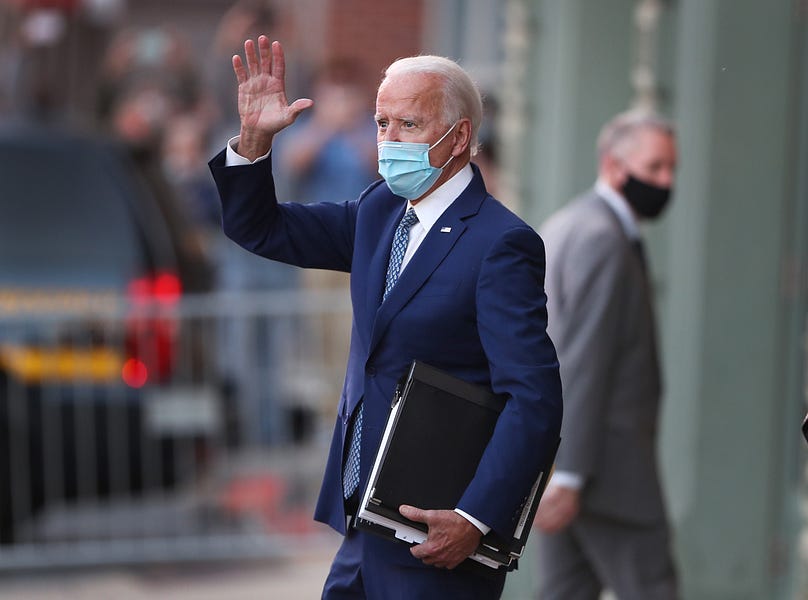This week, I’m enjoying some extra time with the Brisket and also smoking a brisket (and a turkey) for Thanksgiving. But I had a great little conversation with Jeremy Edwards, Joe Biden’s Georgia press secretary, that I thought I would share with all of you, offering a glimpse into what it feels like to win a presidential race and to flip a state for the first time in 28 years.
Jeremy worked for me at the Department of Justice as a career press assistant. He was always eager to take on more responsibility and came prepared to every conversation. He was never too tired, never too overwhelmed to share a kind word or let out a big laugh that would echo down our marble hallways. I’m so proud of what he has gone on to accomplish in just a few short years. It is one of the joys of working in this business to get to know so many young, hungry, and patriotic people from across the political spectrum and watch them reach their potential and leave their mark. So without further ado, here’s my conversation with Jeremy.
Sarah: Obviously y’all wanted to win Georgia and there were some indications that it would be close, but most people didn’t think it would actually happen. So what was Election Night like as results started to come in? What was the mood? When did y’all start to think ‘oh wait, we just flipped Georgia for the first time in nearly three decades’?
Jeremy: Going into this election we knew that Georgia was well on its way to turning blue thanks to the work of Stacey Abrams and other grassroots organizations across the state. It was simply a matter of building on that momentum and reaching out to voters across the Peach State with one of the most sophisticated voter outreach programs in electoral history. In particular, our campaign was able to build a broad coalition across the state using a groundbreaking, digital-first organizing approach that put the health and safety of Georgians first, meeting voters where they were by engaging them on every platform and hosting daily virtual events in every part of Georgia. The campaign also secured the support of key elected officials across the state of Georgia, in urban, suburban, and rural areas, in order to further coalesce a diverse coalition of voters. As the results have shown, that strategy proved to be a stunning success.
Election night was electric, especially given this was one of my first campaigns. It was definitely nerve wracking watching the results come in, especially because we knew that we might not get a result that night or even that week. In fact, it wasn’t until I returned to Georgia for the audit that major news networks had begun to call the race here. And that feeling was something that I really cannot describe. It was like a huge weight had been lifted off of me and I honestly teared up a bit knowing that all the hours of sleep I had lost and all the empty calories I had consumed over the course of the campaign had been worth it.
And it’s bigger than just me, ya know? Like the reason I left the DOJ to work in Congress, the reason I came to this campaign in the first place was because I felt this president had failed the American people in so many ways, and being able to know I was a part of the process to take this nation back is something I will carry with me forever.
Sarah: What was the communications strategy in Georgia—and why do you think Georgia flipped when other states like North Carolina or Florida didn’t?
Jeremy: Our strategy was pretty simple: make sure that every person in Georgia knows all the ways that they can vote in this election—whether by mail, early in person, or on the day of Election Day, as well as reminding those voters what was at stake this election.
The names of President-elect Joe Biden and soon-to-be former President Donald Trump weren’t the only things on the ballot this election. Tackling this pandemic was on the ballot. Protecting people with pre-existing conditions, like the folks in my family and even myself, was on the ballot. Reforming our criminal justice system and addressing the climate crisis was on the ballot. So, in addition to making sure voters knew when, where, and how to vote, we were also reminding voters why they needed to vote in this election.
And we weren’t just focusing on turning out the vote in the major metro areas either. We were campaigning just as hard in rural and suburban areas and reminding voters there that even though Joe Biden was running as a Democrat, he would be a president to all Americans.
I won’t speak to why FL and NC didn’t come along, but I think you know that, as someone who has worked on campaigns yourself, there are a lot of factors at play, and I know you and others will pore over those factors for the coming weeks/months/years. I do know that the folks in NC and FL worked incredibly hard, just as hard as we did in GA, and I know they have absolutely nothing to be ashamed of. At the end of the day, the voters in Georgia are different from the voters in other states, and the ones in NC and FL made different choices, which is a beautiful part of living in such a diverse democracy.
Sarah: Democrats didn’t perform as well down-ballot as they expected to. And now you have folks with a lot of credibility within the Democratic Party like Cedric Richmond and Henry Cuellar pointing the finger at the progressive left. Congressman Vicente Gonzalez was just quoted as saying “Defund police, open borders, socialism—it’s killing us.” You were obviously in Georgia, a state that still has a conservative reputation, what does the future of the Democratic Party look like at this point?
Jeremy: The beauty of the Democratic Party is its diversity, not only its racial, ethnic, and religious diversity, but our diversity of ideas. The fact is that we got a big tent, with a lot of different folks who have a lot of different opinions on how we get to a more equitable and just society. We may disagree on the best way to get there in terms of both messaging and policy, but we all agree on where we need to go.
We’re not each other’s enemies. We are a family, and as someone who comes from a big family myself, I know that even when we are yelling or fighting with one another, the love is still there. And that’s how I feel about the future of Democratic Party. We have our differences in approach, but we are all moving in the same direction, and we are all in this together.
Sarah: I have to ask about the special elections in Georgia. Are you sticking around down there? Can Democrats win these seats? What is the message that will turn out Democratic voters at this point?
Jeremy: I don’t have any plans to stick around following the recount and plan to return to (remotely) work on Capitol Hill for the Honorable Bobby L. Rush of Illinois. However, I am confident that the team that’s here in Georgia is ready for round two, and for anyone who thinks we can’t win those two Senate seats, I would kindly remind them of what we were able to do this November.
Regarding message, I know folks here will continue to reach out to voters to remind them what’s at stake. It’s great that we were able to take the presidency and maintain control of the House, but Joe Biden’s job will be a hell of a lot easier if Democrats have control of the Senate as well. We will be in a much better position to pass meaningful relief for families and small business owners suffering from the pandemic, we will be in a much better position to appoint qualified Cabinet officials and Judges/Justices, and it will be much easier for Joe Biden to protect and strengthen the ACA and pass meaningful climate legislation and bills like the George Floyd Justice in Policing Act.
Sarah: So what do Democrats need to do in the next 6 weeks to win those two senate seats?
Jeremy: Ordinarily, Democrats have not had much success when it comes to turning out voters in runoffs and other special elections, but this is no ordinary runoff. Democrats know that the future of the Senate rides on winning not one, but both of these seats, and momentum is on our side given Biden’s win this November.
The name of the game for both sides will be turnout. Although Republicans and Democrats both turned out in record numbers for the general election, it will be interesting to see how Trump’s baseless claims of widespread voter fraud will impact Republican voters. On the other hand, Democratic voters are likely to be more energized having just turned Georgia blue, and knowing that another win here would give Biden the ability to enact more progressive legislation.
I ultimately think we should stick to the basics: register more eligible voters and encourage more folks to take advantage of absentee voting and early voting. This will be especially critical given that Biden outperformed the Democratic Senate candidates in Georgia. However, the Republican Candidates there are currently telling their own voters that the November election was rigged (spoiler: it wasn’t) while imploring those same voters to turnout for them this January. So we will have to see what type of impact that has on voters.
That said, Trump told his own voters that they shouldn’t vote by mail this past November, and we saw how that turned out for him.
Biden’s victory in Georgia was historic, and I was proud to be a part of it, but it’s no secret that Democrats underperformed in other areas. So I think a better question is, what do Republicans need to do in the next six weeks to not lose these seats?
Sarah: Have you recovered yet? For me, it would take months to fully recuperate after a presidential campaign. But those first couple weeks were always the hardest to try to transition back to “civilian life.” What was the thing you wanted to catch up on most: food, friends, sleep, tv, sports?
Jeremy: Haha, I haven’t really had much time to recover with the audit/recount just wrapping up here, and I’ll be back in the saddle once I return to Congress, but immediately following the election, I was inspired to get back into Veep, which is somewhat triggering at times to be honest. I’m also looking forward to getting 8 hours of sleep (almost) every night.
A silver lining of this terrible pandemic is that before coming to Georgia I’ve been able to return to my hometown of Syracuse, NY, and work remotely from there, which has been great in terms of being able to spend more time with my family. So I’m looking forward to getting back to Cuse and spending the holidays with them following a self-quarantine and a few negative COVID tests. Fingers crossed.
Photograph by Joe Raedle/Getty Images.









Please note that we at The Dispatch hold ourselves, our work, and our commenters to a higher standard than other places on the internet. We welcome comments that foster genuine debate or discussion—including comments critical of us or our work—but responses that include ad hominem attacks on fellow Dispatch members or are intended to stoke fear and anger may be moderated.
You are currently using a limited time guest pass and do not have access to commenting. Consider subscribing to join the conversation.
With your membership, you only have the ability to comment on The Morning Dispatch articles. Consider upgrading to join the conversation everywhere.